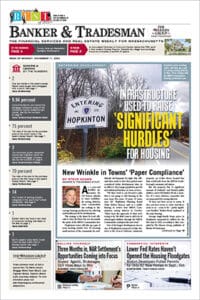
Anne Meczywor
In February, the National Association of Realtors debuted a new national advertising campaign titled “That’s Who we R®”. The goal of the campaign is to educate consumers on the Realtor difference. One of these differences being highlighted is our association’s advocacy work on behalf of home owners.
Late Speaker of the House and Massachusetts Congressman Tip O’Neill was famous for saying “all politics is local.” Those of us in the real estate business believe all real estate is local too. So, it makes sense that as a state association, our advocacy work on behalf of homeowners reflects concerns across the commonwealth. Here are the Massachusetts Association of Realtors 2019-2020 legislative priorities that we advocated for at our 34th Annual Margaret C. Carlson Realtor Day on Beacon Hill on June 12.
Support Housing Production
MAR supports two bills that will increase housing production.
The first is the H.O.M.E. Bill, which MAR developed and first introduced in 2014. This bill seeks to remove existing barriers to housing production through several complex zoning changes. For example, it would increase availability of open space or “cluster” development that allows for smaller lot acreage requirements than traditional subdivisions. These changes would diversify housing options and preserving open space.
The bill also removes barriers to construction of accessory dwelling units (ADUs). Commonly known as “in-law apartments,” ADUs are small, self-contained dwellings with their own entrance, kitchen, bathroom and sleeping area associated with a single-family home. ADUs will provide more housing options and help homeowners enhance the value of their homes. Finally, it promotes local development by easing restrictions on zoning variance and site plan review procedures.
The second bill that MAR supports is An Act to Promote Housing Choices. This is a bill that nearly passed with our support last session and was again named by Gov. Charlie Baker as one of his top priorities. The bill gives municipalities more tools and incentives to increase housing development. The big change this bill would do is allow permitting cities and towns to modify zoning laws by simple majority rather than the current two-thirds majority vote for certain housing related issues. This will increase housing production options for smart growth zoning districts, such as allowing cluster development and ADUs, and will enhance the ability to add housing near public transportation hubs.
Support for First-Time Home Buyers
MAR has also proposed An Act Authorizing the Establishment of First–Time Homebuyer Savings Accounts.
This bill permits future home buyers to deposit up to $5,000 per year into a first–time homebuyer savings account and then claim that contribution as a deduction on their income tax.
This measure will help people save towards homeownership. This would lead to wide-ranging economic and community benefits, including payment of property taxes, local business patronization and community stability.
Oppose Transfer Taxes
We have long history of strongly opposing any new real estate transfer taxes which authorize the creation of a tax on the sale of a home. The imposition of this type of tax on housing would have serious implications for the Massachusetts economy and set the wrong precedent for the commonwealth’s tax policies.
Specifically, MAR opposes An Act Providing for Climate Change Adaptation Infrastructure Investments in the Commonwealth. Proposed by the governor, this transfer tax would create a 50 percent increase in the deeds excise tax. In addition to this bill, Massachusetts communities facing budgetary deficiencies regularly seek transfer tax authority to solve local revenue problems.
However, creating an entrance or exit fee to homeownership is the wrong way to solve climate change or municipal funding problems. Transfer taxes increase the bottom-line price of most homes by thousands of dollars. This creates an additional barrier to homeownership for many. Transfer taxes also unfairly single out home buyers and sellers to carry a disproportionate weight in funding government programs.
Oppose Mandatory Energy Scoring
Realtors are for energy efficiency. However, we oppose bills and regulations that would require sellers to have their homes inspected and rated through a Mass Save energy audit prior to listing a home for sale.
This regulation would have an enormous impact on an individual’s right to freely transfer property. These requirements would negatively affect the real estate industry in the commonwealth, which is home to some of the oldest housing stock in the country. Mandatory energy scoring would significantly stigmatize these older homes and devalue many individual’s largest investment.
We need to continue to incentivize homeowners to improve the energy efficiency of their home, not punish those that cannot afford to improve their homes.
Anne Meczywor is the 2019 president of the Massachusetts Association of Realtors and a broker/associate with Roberts & Associates Realty Inc., in Lenox.




